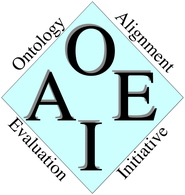Bio-ML Track
OAEI 2023::Bio-ML Track
General description
The 2023 edition involves the following ontologies: OMIM (Online Mendelian Inheritance in Man), ORDO (Orphanet Rare Disease Ontology), NCIT (National Cancer Institute Thesaurus) and DOID (Human Disease Ontology), FMA (Foundational Model of Anatyomy) and SNOMED CT. Compared to the 2022 edition, we made the following key changes:
- Adopt locality-based logic modules to enrich existing pruned ontologies with logical and structural context from their original versions. The added entities are annotated as "not used in alignment".
- Introduce a new special sub-track, Bio-LLM for Large Language Model-based OM systems.
- Simplify the file structure and task settings to certain extent.
A complete description is available at the Bio-ML documentation.
Resources
Evaluation
Full details about the evaluation framework (global matching and local ranking) and the OAEI participation (result format for each setting in the main Bio-ML track and the new Bio-LLM sub-track) are available at the Bio-ML documentation.
We accept direct result submission via the google form with trust. We will also release results for systems based on our implementations and for systems submitted via MELT. These three categories will be specified on the result tables.
Results
Note: Click the column names (evaluation metrics) to sort the table; Cells with empty values suggest that the corresponding scores are not available.
The super-script symbols indicate that the results come from MELT-wrapped systems (†), our own implementations (‡), and direct result submission (∗) , respectively. It is important to notice that direct result submissions are based on trust.
Bio-ML Equivalence Matching Results
For equivalence matching, we report both the global matching and local ranking results.
For the global matching evaluation, the test mapping sets for unsupervised (not using training mappings) and semi-supervised (using training mappings) systems are different; the unsupervised test set is the full reference mapping set while the semi-supervised test set is the 70% reference mapping set (excluding 30% training mappings). Some systems may not use the training mappings (e.g., BERTMapLt, LogMap, etc.), but we still report their performances on the semi-supervised test set. The use of training mappings for the semi-supervised setting is indicated by ✔ (used) and ✘ (not used).
For the local ranking evaluation, we keep one ranking test set for both unsupervised and semi-supervised systems.
